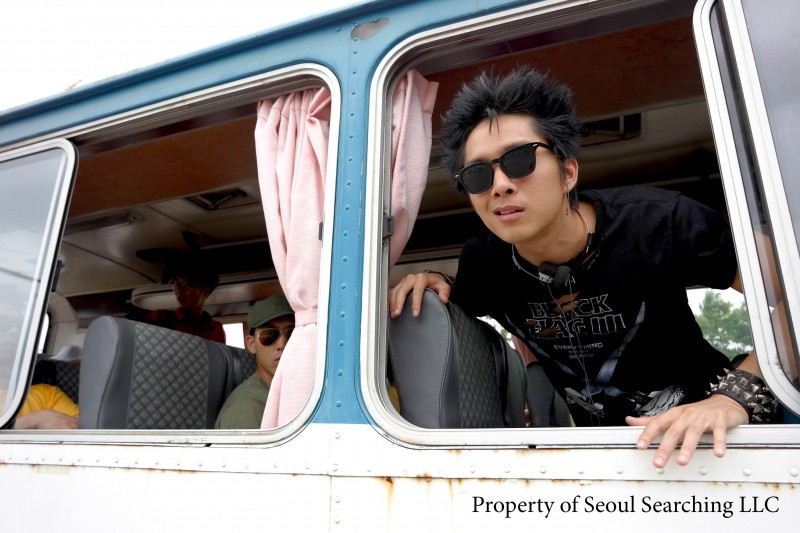by JAMES S. KIM | @james_s_kim
editor@charactermedia.com
When actor Justin Chon spoke to KoreAm months ago about his role in Revenge of the Green Dragons, he seemed considerably more excited about another project he was attached to: Seoul Searching, an indie film based on writer-director Benson Lee‘s personal experiences as a teenager at a summer camp in Seoul back in the ’80s.
In Seoul Searching, which premieres at the Center for Asian American Media Film Festival (CAAMFest) in San Francsico on March 12, Chon plays Sid Park, a punk who has problems with authority. He doesn’t want to be in Korea that summer, and his perpetual scowl shows it. But while Sid’s clothes and sneer signal “tough guy,” they serve to cover up his own insecurities and yearning for his father’s acceptance back home.
When we followed up with Chon earlier this year to get his full perspective on Seoul Searching, Chon spoke about how the film connected with him on so many levels, from working with the other cast members, including veteran South Korean actor Cha In-Pyo, as well as the themes that allowed him to reflect on his own identity as a Korean American.
This interview has been edited for length and clarity.
 (From left) Students Mike Lee (Albert Kong), Sid Park (Justin Chon), Grace Park (Jessika Van) and Sara Han (Sue Son) arrive at camp in Seoul Searching.
(From left) Students Mike Lee (Albert Kong), Sid Park (Justin Chon), Grace Park (Jessika Van) and Sara Han (Sue Son) arrive at camp in Seoul Searching.
What made you so excited about Seoul Searching ?
Justin Chon: I felt that it was something that was close to me, who I am, the stuff I dealt with growing up.
For guys, it’s that basic relationship with your dad. I love my dad, and we have a great relationship, but there’s a lot of miscommunication and cultural differences growing up outside of Korea that we touch upon. Korean dads usually don’t say, “I love you.” I mean, that’s pretty rare. That’s pretty weird. They come from post-war, so their main thing is surviving and also providing for your family and being a man and a pillar in the family. Growing up in these first-world countries, we have a completely different experience than our parents. It’s a lot more free. We see our peers, our Caucasian peers, who can go to their parents and say, “I love you,” or go to them with their problems, but that’s just not realistic as a second-gen Korean.
Just being a rebel growing up, I really connected with my character Sid, who thinks he’s f–king Sid Viscious. Now, as an adult, I know why I rebelled so much. It was a cry for attention—you just want love. At the end of the day, it’s just that you want love. And that’s what all that rebellion is. “Look at me, pay attention to me.” That’s all it is.
After doing this movie, it really closed a chapter in my life and allowed me to let go of a lot of things and to move on and focus on other things.
 Esteban Ahn as Sergio Kim, left, and Justin Chon as Sid Park.
Esteban Ahn as Sergio Kim, left, and Justin Chon as Sid Park.
What themes were you able to explore with such a diverse cast, including co-stars Esteban Ahn and Teo Yoo, who grew up in Spain and Germany, respectively?
My main thing that I got out of it was that—and I think this was part of Benson’s intentions as well—we’re so different. I grew up in the U.S. We have such different experiences, but it’s so interesting that our experiences are very similar in terms of the main struggles we go through as second-generation gyopos.
It’s just different perspectives. For example, the way the characters think of life, I don’t think that’s necessarily because they grew up in Spain or Germany; I think it’s just difference in personality. There are some archetypal things—the American’s a rebel, the Spaniard is the party animal, and the German is the conservative economist. But when you get really deep into it, we’re all just sons of Korean fathers. That’s what unites us, and we share a lot of common experiences.
At the beginning of the movie, we see these completely different people interacting and by the end of the movie, we see them becoming brothers. I think that’s the heart of it.
 From L to R: Klaus Kim (Teo Yoo), Sid, Sergio and Mike Lee (Albert Kong) go face to face with the girls at camp.
From L to R: Klaus Kim (Teo Yoo), Sid, Sergio and Mike Lee (Albert Kong) go face to face with the girls at camp.
What allows Sid, Sergio (Esteban Ahn) and Klaus (Teo Yoo) to bond over the course of the camp?
We, all to a varying degree, have some sort of miscommunication with our parents and are at odds with them. It manifests in how we just deal with it differently. Sergio is more of a womanizer. I’m more of a rebel. Klaus just wants to be successful because he doesn’t want to be what his parents are. That’s pretty evident.
Sid’s dad is never satisfied with him. He’s really hard on him, and everything he does, it’s not good enough. Esteban didn’t have a dad. His dad passed away, but he was a womanizer. You’re the product of your parents sometimes, and Esteban’s kind of an example of that without even realizing it.
Klaus, his parents work really hard. They own a Bratwurst company, but he doesn’t want to do that. He wants to be even more successful. His MO is, he wants to be one of the most successful Korean German businessmen and surpass what his parents did.
We’re all very different in terms of aspirations and how we deal with life.
What drew Sid romantically to Grace Park (Jessika Van)?
They’re cut from the same fabric. They’re both American and really into pop culture—I’m into Sid Vicious, and she’s into Madonna. We’re both really into music. We’re both rebels. At the core of it, we’re both sensitive souls, but we put up a front.
She tries to be the sex kitten, this sex object, and wants people to think that she’s sexually experienced. I try to make people think I’m such a badass, [but I’m more like] the American James Dean, a rebel without a cause (laughs).
We are obviously attracted to each other because we’re the most familiar with the opposite. We look at each other, and we’re pretty much the same person, in a way.
 Esteban Ahn (front left) preps for a scene with Justin Chon.
Esteban Ahn (front left) preps for a scene with Justin Chon.
Were you familiar with Benson Lee’s work prior to working with him?
When I was filming the first Twilight, I watched Planet B-boy without knowing [what it was]. I really commend him for that movie, because I just thought it was a b-boy documentary. I went to a theater by myself in Portland, and I watched it by myself. I was so shocked by that movie, because I had no idea there was a Korean element to it.
It was so well-disguised. It was just so smart to get across that Korean perspective without shoving it right down your throat. I had gone in knowing nothing about that movie except that it was a b-boy documentary, and I was legit blown away. I cried in that movie because it has the same sort of theme, that father/son theme, and I was really moved by that documentary.
How does Benson work as a director?
He’s pretty open. He has certain things that he’s really adamant about what he wants and he fights for, and that’s good, any good director should do that.
I was always allowed to make suggestions and try stuff. We’d do rehearsals and have the framework, but in the take, I would try new stuff all the time, and Benson was always cool with it. If something doesn’t work, it doesn’t work. We’d just scrap the idea.
Benson really sticks to what his vision is. He really has his main thing he wants to get across, the stylistic things, and he makes sure to get that in there. But at the same time, he’s very flexible, which as an actor, that’s amazing. [From an actor’s perspective], Benson is an awesome director to work with.
The film takes place in 1986 Korea. How did the setting help portray some of the themes in this movie?
1986 was a completely different time. Now, when you go to school, especially in metropolitan cities, you see these Asian kids going to school, and they’re so assimilated now. It’s not even that big of a deal. The racism, especially in California and New York, is so much less than what I had to deal with. I remember being called “Chinaman” and “ching chong.” That was way more prevalent.
As a Korean American, you really had to have a definitive identity. Otherwise, you kind of get lost from the pack. There was more of an innocence in the ’80s among second-generation Koreans. They might act the part, but they were a lot more innocent. These days, with the Internet and social media, it’s so easy to find information. Back then, there was none of that. All you had was MTV and that kind of stuff.
Another fact is that Korean Americans haven’t been around for that long. Koreans haven’t been around any country for that long. My parents immigrated in 1980. Had me in ’81. They were still completely Korean.
Now, Korean parents are a lot more open. The parents who immigrated to America, Germany, Spain [and other countries] during the ’60s, ’70s, ’80s are still stuck in that ’60s mentality and never progressed with the times, as opposed to Korean parents in Korea, who are way more open-minded.
I think we’ll never see that again, that era of “fish out of water.” It does lend to the product of being a second generation Korean American. From a stylistic standpoint, it’s been enough time that it does seem like an era. We’ve been separated long enough to make it seem like that.
 From L to R: Actors Cha In-Pyo, Justin Chon, Esteban Ahn and Teo Yoo.
From L to R: Actors Cha In-Pyo, Justin Chon, Esteban Ahn and Teo Yoo.
How was it working with Cha In-Pyo?
I grew up watching his dramas. My parents would always have dramas on in the house. It was really amazing working with such a Korean icon. He’s been around forever, and he’s an OG. He’s been through it all. The fact that he’s still around means he’s so phenomenal.
Working with him was such an honor, and also so cathartic as well. My parents love that I’m an actor and they’re proud of me, but the fact that I got to work with Cha In-Pyo all of a sudden really legitimized me. It was so awesome, I loved it. It was surreal as well.
People [bring up] the moment I worked with Robert De Niro or Al Pacino, but for me, working with Cha In-Pyo was on another level with the cultural significance.
He always made me feel comfortable and never made me feel inferior or that I needed to respect him. He garnered that respect just by being who he is. I absolutely loved working with him. At the end of the day, he’s just a beautiful human.
You can check out KoreAm Journal’s cover story on Benson Lee and Seoul Searching here.
___







